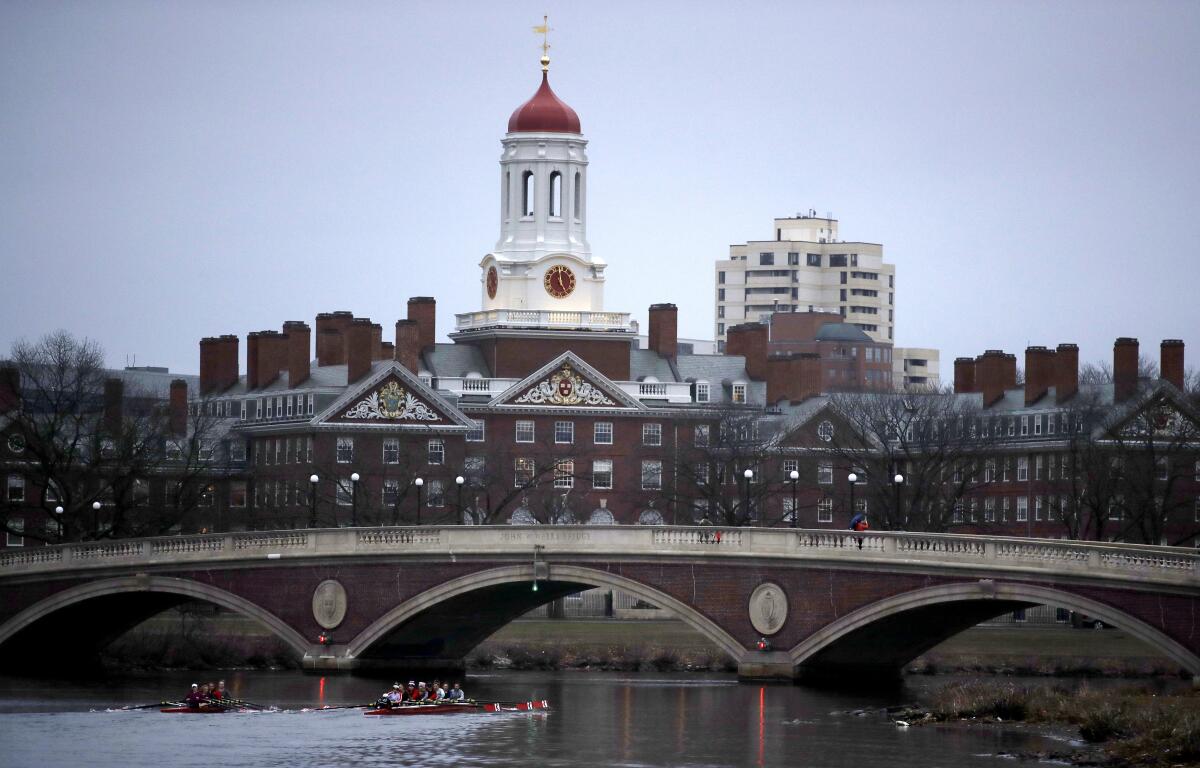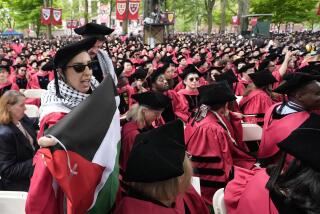Harvard freshman says he was denied U.S. entry over friends’ social media posts

- Share via
Ismail Ajjawi made headlines in Lebanon as a 14-year-old growing up in a ramshackle camp for Palestinian refugees — for being one of the top scorers on the country’s primary school exams. This year he aced the secondary school exam, helping earn him a full scholarship to Harvard University.
He secured a student visa and, with dreams of becoming a surgeon, had already decided on a major — chemical and physical biology.
“There’s room for discoveries in this field,” the 17-year-old said in an interview with Al-Araby TV that aired Friday as he was arriving in the United States.
“Excellence requires work and effort too,” he told the interviewer. “I always had this goal. I managed my time, studied everything, to get this result.”
But his plans were thrown into limbo after he landed at Boston Logan International Airport.
Immigration authorities spent hours combing through social media accounts on his phone and computer before denying him entry to the United States, according to an account Ajjawi provided to the Harvard Crimson.
The reason? His online friends were critical of the U.S., he was told.
Ajjawi protested, saying he didn’t like, share or comment on such posts and should not be held responsible for them. He was allowed to call his parents before being sent back to Lebanon.
It’s unclear whether he will be allowed into the U.S. before classes begin Sept. 3.
His denial comes amid heightened concern at Harvard and other universities over making sure international students and scholars can enter the country amid a far-ranging crackdown on legal immigration.
That includes the effects of the Trump administration’s ban on travel to the United States by nationals of Yemen, Iran, Libya, Somalia, Syria, North Korea and Venezuela. Several international Harvard students were initially prevented from entering the U.S. after President Trump signed the first iteration of his travel ban in 2017.
Last month, Harvard President Lawrence S. Bacow said in an open letter to Secretary of State Michael R. Pompeo and Homeland Security Secretary Kevin K. McAleenan that he had “deep concern” over immigration policies.
“Students report difficulties getting initial visas — from delays to denials,” he wrote. “Scholars have experienced postponements and disruptions for what have previously been routine immigration processes such as family visas, renewals of status, or clearance for international travel.”
“Visa policies mandating increased scrutiny of foreign students and scholars (and sometimes naturalized US citizens) from certain countries contribute substantially to mounting concern.”
International students are expected to make up 12.3% of the 1,950 students in Harvard’s Class of 2023. Country-specific data is not available for this year, though last year’s admitted freshmen included two from Lebanon.
As of March, there were 1,201,871 international students in the country, down 2.9% from a year earlier, according to U.S. Immigration and Customs Enforcement. That figure includes K-12, college, universities and language study programs. It also includes students who work in the country for up to three years after graduation.
The drop has been steeper in higher education, with enrollment down roughly 10% over the last two academic years, according to the nonprofit Assn. of International Educators, which has expressed concern that recent changes to U.S. visa policies will hurt international scholars.
Ajjawi said he was in a group of international students at the Boston airport when immigration officials singled him out, the Crimson reported.
The others were allowed to exit. He was questioned about his religion before the authorities confiscated his computer and phone for five hours.
“When I asked every time to have my phone back so I could tell them about the situation, the officer refused and told me to sit back in [my] position and not move at all,” he told the student newspaper in a written statement. “After the 5 hours ended, she called me into a room, and she started screaming at me. She said that she found people posting political points of view that oppose the US on my friend[s] list.”
“I responded that I have no business with such posts and that I didn’t like, [s]hare or comment on them and told her that I shouldn’t be held responsible for what others post,” the statement said. “I have no single post on my timeline discussing politics.”
On a Facebook account that appears to belong to Ajjawi, the only posts visible to the public are four from him. Only one is related to the United States, an Aug. 16 announcement that featured the Harvard “veritas” coat of arms and announced he was starting at the university. It elicited dozens of likes and comments congratulating him.
“Good luck!” some said, while others praised him by saying, “May God bless you.”
The profile has several photos, including one of Harry Potter and another of members of the Dutch national soccer team in the 2014 FIFA World Cup. The account, which uses the spelling Ismael Ajjawi, has 752 friends, including several whose profiles also say they attend Harvard.
The State Department began requesting social media account information for visa applicants this year. During the Obama administration, submitting social media account information was typically optional. In general, immigration authorities have wide latitude to deny entry to foreign visitors who are not citizens or permanent residents.
Between October and July, U.S. Customs and Border Protection deemed 235,467 people to be inadmissible at U.S. borders. About 43% of those have been at the border with Mexico.
Harvard spokesman Jason Newton said Tuesday that “the university is working closely with the student’s family and appropriate authorities to resolve this matter so that he can join his classmates in the coming days.”
Newton said he could not provide more information on the case. A lawyer representing Ajjawi’s family did not return a call from The Times seeking comment.
A spokesman for U.S. Customs and Border Protection said Ajjawi was “was deemed inadmissible to the United States based on information discovered during the CBP inspection” and declined to share any more details about the case.
“Applicants must demonstrate they are admissible into the U.S. by overcoming all grounds of inadmissibility including health-related grounds, criminality, security reasons, public charge, labor certification, illegal entrants and immigration violations, documentation requirements and miscellaneous grounds,” said the spokesman, Michael S. McCarthy.
Foreigners who are denied admission at U.S. airports are generally eligible to reapply for visas.
Kaleem reported from Los Angeles and Bulos from Amman, Jordan. Andrea Castillo and Claire Collins in Los Angeles contributed to this report.
More to Read
Sign up for Essential California
The most important California stories and recommendations in your inbox every morning.
You may occasionally receive promotional content from the Los Angeles Times.












